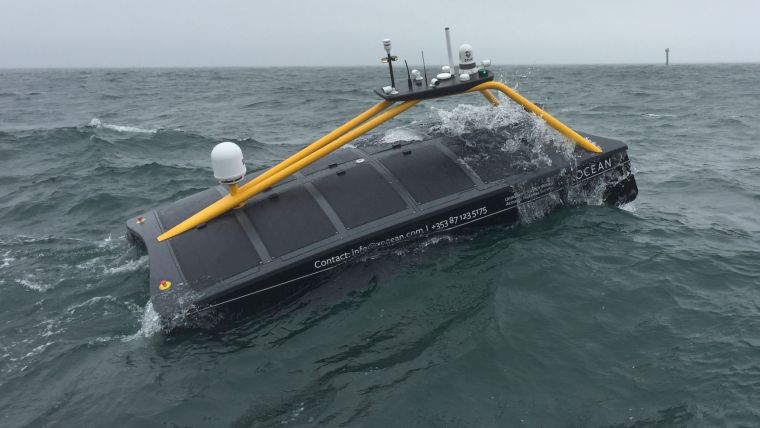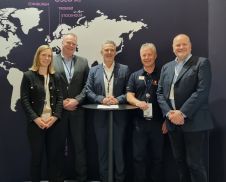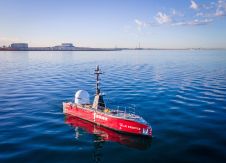Seafarers Can Now Change Their Course
Job Opportunities for those with Marine Backgrounds
Do you have a marine background and are you looking for a new job? Being a USV pilot could be the next step in your career, James Ives, CEO of XOCEAN explains.
His company currently has openings for USV Pilot & Surveyor positions as well as Software Engineers and plans to recruit an additional 60 employees in the next year to meet increasing market demand.
As an extensive buyer of ocean data in his previous role as CEO of a marine engineering business, founder James Ives saw a need to transform the way in which ocean data was captured. As a customer, he thought there had to be a better way to collect it and in early 2017 he established XOCEAN.
Based on the northeast coast of Ireland, his company is transforming the way data is collected from our oceans using Unmanned Surface Vessels (USVs). The innovative X0-450 USV platform is designed and manufactured in Ireland where the company recently opened a new Technical Centre and 24-hour Control Room for operating its fleet of USVs globally.
Safety and Efficiency
The company currently has two USV systems in operation and a further eight in construction, with a target to have a fleet of 100 USVs in service within three years. The use of unmanned vessels offers significant benefits including safety with operators remaining onshore, the efficiency with 24/7 operations and environmental, with a USV generating approximately 1000th of the emissions of a conventional survey ship.
The services offered by James Ives’ company range from seabed mapping, to monitoring the environment, to the inspection of subsea structures including subsea pipelines, offshore wind foundations and inter-array cables. Recently, the Irish completed over 2,000 hours of unmanned bathymetric survey off the coasts of Scotland and England as part of the UK’s Civil Hydrography Programme (CHP), administered by the Maritime & Coastguard Agency (MCA).
XOCEAN has also completed acoustic fisheries surveys for Ireland’s Marine Institute in the central Celtic Sea. In one such mission, the USV transited from Milford Haven to the survey location 100nm offshore and performed data collection over several days. Data from the survey was used as part of Ireland’s fish biomass submission to the EU.
Using USVs, XOCEAN provides turnkey data collection services to surveyors, companies and agencies. From mapping the seabed to environmental monitoring, the platform offers a safe and economical solution to collecting ocean data.
The following is an interview with James Ives, CEO of XOCEAN, about the past, present and future operations of his company.
Hydro International: How did your company get started?
James Ives: The Organization for Economic Co-operation and Development (OECD) are predicting the ocean economy to double to US$3 trillion by 2030. We believe the foundation of that growth is data.
Using USVs, we provide turnkey data collection services to survey companies and agencies. Applications range from seabed surveys, e.g. multi-beam bathymetry, side scan and sub-bottom profiling, to environmental monitoring, e.g. data harvesting, fisheries surveys and met-ocean data.
The traditional approach to collecting data from the oceans has been to send out a boat with a crew of people, but we do this differently using USVs that are monitored and controlled from shore. Our platform offers significant benefits including safety with operators remaining onshore, the efficiency with 24/7 operations and environmental, with a USV generating approximately 1000th of the emissions of a conventional survey ship.
HI: You recently started using a special technical centre for unmanned vessels. What was the reason for doing this?
JI: Demand for our services has grown quickly, having recently completed multiple projects for BP and over 2,000 hours of unmanned bathymetric surveys off the coasts of Scotland and England as part of the UK’s Civil Hydrography Programme (CHP), administered by the Maritime & Coastguard Agency (MCA). To meet market demand, we plan to increase our fleet to 100 USVs in the next three years. The opening of our new Technical Centre in Ireland is central to the company’s expansion programme providing us with the space needed to service our growing fleet of USVs.”
HI: What is the function of this centre and how does it work?
JI: The new Technical Centre and 24-hour Control Room acts as a hub for operating our fleet of USVs globally. What we offer is an over-the-horizon operation. Regardless of where in the world the project is taking place, we can monitor and operate the USVs from our base here in Ireland.
Each USV sends real-time images and situational awareness data to our Technical Centre where USV Pilots keep watch and control the vessels 24/7 via the CyberDeck platform, a highly secure cloud-based environment developed by XOCEAN. The CyberDeck also allows our USV Pilots to monitor the quality of the data being collected and to adjust both the USV and sensor parameters as required.
HI: You have a large number of vacancies. What kind of people are you looking for to staff the operating centre?
JI: We plan to recruit an additional 60 employees in the next year to meet increasing market demand and currently we have openings for USV Pilot & Surveyor positions as well as Software Engineers. USV Pilots are responsible for the safe navigation of the USV and controlling and monitoring the data collected during a project. We therefore look for people with marine backgrounds and qualifications, as well as those with experience working with software such as Applanix POSPAC, QINSy, EIVA NaviSuite.
HI: You also provide training for operators. Can you tell me something more about that?
JI: Our USV Pilots complete 100 hours of operational training at our Technical Centre in Ireland. Here, Trainee Pilots learn from our experienced USV Pilots and Survey Managers. Their training encompasses both the theory and practical application of the skills required to safely pilot an XOCEAN USV and to monitor and control data collected. Subjects covered include USV navigation and control, survey system operation and data QC.
HI: Seafarers are concerned about the loss of jobs in their sector. How do you view this?
JI: The industry is growing rapidly, and we see great opportunities for seafarers in this space. Seafarers are an essential part of our service, from the technicians who service our growing fleet to the USV Pilots in the Control Room monitoring and controlling the USVs; we are always on the lookout for skilled seafarers to join the team.
HI: What do you expect from the future of the way unmanned vessels are deployed?
JI: We expect USVs to be deployed in a variety of ways, but increasingly used together to reduce survey time and improve efficiency, as well as spatial and temporal resolution of surveys. We see a future where a number of USVs act in a co-ordinated manner to conduct, for example, a fish-stock assessment survey or mapping highly changeable seabeds.
HI: Which technological innovations can we expect in the coming period?
JI: Continual improvements in enabling technologies such as computing power, battery technology, machine learning and artificial intelligence techniques, along with new developments in satellite internet technology, will lead to improved USV capabilities. Techniques and systems for integrating USVs with additional vehicles (aerial and subsea) will also lead to exciting new capabilities.
Acknowledgment
This article was written in collaboration with Claire Quinn at XOCEAN.

Value staying current with hydrography?
Stay on the map with our expertly curated newsletters.
We provide educational insights, industry updates, and inspiring stories from the world of hydrography to help you learn, grow, and navigate your field with confidence. Don't miss out - subscribe today and ensure you're always informed, educated, and inspired by the latest in hydrographic technology and research.
Choose your newsletter(s)
























